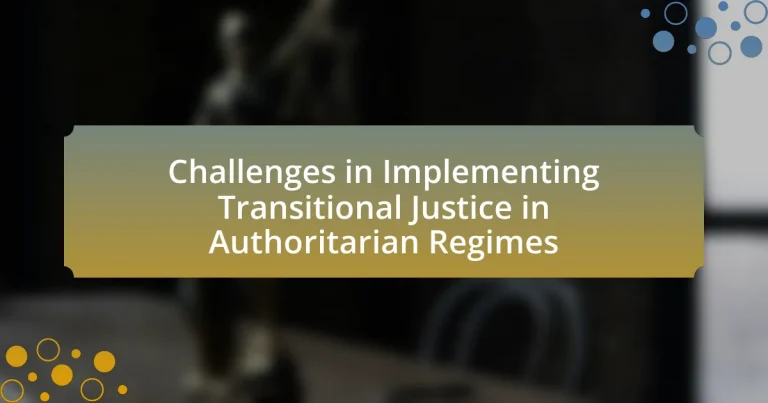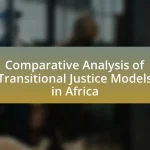The article examines the challenges of implementing transitional justice in authoritarian regimes, highlighting key obstacles such as lack of political will, suppression of dissent, and limited access to information. It discusses how authoritarian governments obstruct justice processes through censorship, manipulation of legal frameworks, and intimidation tactics, which undermine accountability and perpetuate impunity. The role of public support and civil society in advocating for transitional justice is emphasized, along with historical precedents and lessons learned from past efforts. Additionally, the article outlines strategies for effectively pursuing transitional justice in these contexts, including international support and grassroots mobilization, while addressing the implications of failing to implement justice mechanisms for societal healing and governance.
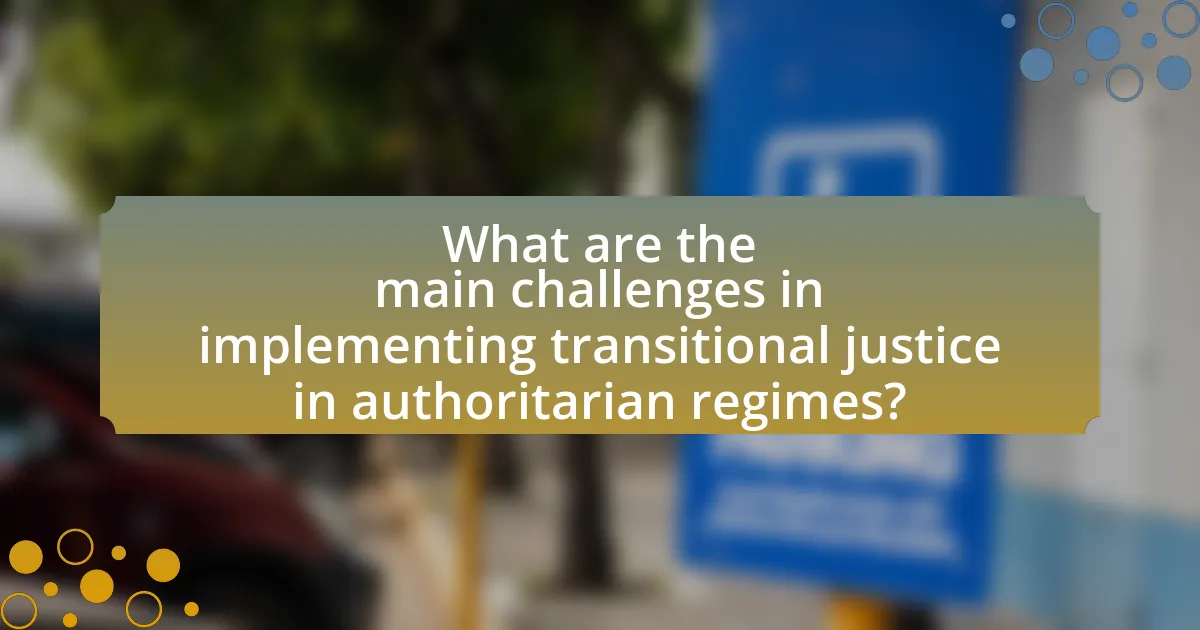
What are the main challenges in implementing transitional justice in authoritarian regimes?
The main challenges in implementing transitional justice in authoritarian regimes include lack of political will, suppression of dissent, and limited access to information. Authoritarian governments often resist accountability measures to maintain power, leading to insufficient support for justice initiatives. Additionally, the suppression of dissent creates an environment where victims and advocates fear retaliation, hindering their ability to seek justice. Furthermore, limited access to information obstructs the documentation of human rights abuses, making it difficult to establish a comprehensive understanding of past atrocities. These factors collectively impede the effectiveness of transitional justice efforts in such contexts.
How do authoritarian regimes obstruct transitional justice processes?
Authoritarian regimes obstruct transitional justice processes by suppressing dissent, controlling narratives, and undermining legal frameworks. These regimes often employ censorship and propaganda to prevent public discourse on past atrocities, thereby limiting accountability for human rights violations. For instance, in countries like Syria and North Korea, state-controlled media portray the regime as infallible, effectively erasing the need for justice or reconciliation. Additionally, authoritarian governments may manipulate judicial systems to protect perpetrators, as seen in Venezuela, where the judiciary is used to intimidate victims and silence opposition. This systematic obstruction not only hinders the pursuit of truth and reparations but also perpetuates a culture of impunity, making genuine transitional justice nearly impossible.
What specific tactics do authoritarian leaders use to undermine justice initiatives?
Authoritarian leaders use tactics such as censorship, manipulation of legal frameworks, and intimidation to undermine justice initiatives. Censorship restricts access to information about human rights abuses, preventing public awareness and accountability. Manipulation of legal frameworks involves altering laws to protect perpetrators or delegitimize justice processes, as seen in countries like Venezuela, where legal reforms have been used to shield government officials from prosecution. Intimidation tactics, including threats against activists and judges, create a climate of fear that discourages participation in justice initiatives, exemplified by the repression of dissent in Belarus. These tactics collectively erode the effectiveness of transitional justice efforts in authoritarian regimes.
How does state control over the judiciary affect transitional justice?
State control over the judiciary significantly undermines transitional justice by limiting judicial independence and impartiality. When a government exerts control over judicial processes, it can manipulate legal outcomes to protect perpetrators of human rights abuses, thereby obstructing accountability and truth-seeking efforts. For instance, in countries like Venezuela, the judiciary has been used to suppress dissent and shield state actors from prosecution, which directly impedes the establishment of a fair transitional justice framework. This control leads to a lack of trust in judicial institutions, discouraging victims from seeking justice and ultimately perpetuating cycles of impunity.
Why is public support crucial for transitional justice in authoritarian contexts?
Public support is crucial for transitional justice in authoritarian contexts because it legitimizes the processes and outcomes of justice initiatives. In authoritarian regimes, where trust in institutions is often low, public backing can enhance the perceived validity of transitional justice measures, making it more likely for these initiatives to succeed. For instance, in post-apartheid South Africa, the Truth and Reconciliation Commission gained significant public support, which helped facilitate national healing and reconciliation. Without such support, transitional justice efforts may face resistance, undermining their effectiveness and potentially leading to further conflict.
What role does civil society play in advocating for transitional justice?
Civil society plays a crucial role in advocating for transitional justice by mobilizing communities, raising awareness, and holding authorities accountable. Organizations within civil society often serve as intermediaries between victims and the state, ensuring that the voices of marginalized groups are heard in the transitional justice process. For instance, in countries like South Africa, civil society organizations were instrumental in the Truth and Reconciliation Commission, which aimed to address past human rights violations. These organizations provide essential support for victims, facilitate public dialogue, and promote legal reforms necessary for effective transitional justice. Their involvement is vital for fostering transparency and building trust in the justice system, particularly in authoritarian regimes where state mechanisms may be unresponsive or repressive.
How can public perception of transitional justice impact its implementation?
Public perception of transitional justice significantly impacts its implementation by influencing the legitimacy and support for justice initiatives. When the public views transitional justice mechanisms as credible and necessary, they are more likely to engage with and support these processes, leading to successful implementation. Conversely, if public perception is negative—stemming from distrust in the government or skepticism about the effectiveness of transitional justice—this can result in resistance, lack of participation, and ultimately, failure of the initiatives. For example, in post-apartheid South Africa, the Truth and Reconciliation Commission gained public support, which facilitated its effectiveness, while in other contexts, such as in some Latin American countries, negative perceptions hindered similar efforts.
What historical precedents exist for transitional justice in authoritarian regimes?
Transitional justice in authoritarian regimes has historical precedents, notably in countries like Argentina, Chile, and South Africa. In Argentina, the National Commission on the Disappearance of Persons (CONADEP) was established in 1983 to investigate human rights violations during the military dictatorship, leading to the publication of the “Nunca Más” report, which documented thousands of cases of forced disappearances. Similarly, in Chile, the Truth and Reconciliation Commission was formed in 1990 to address human rights abuses under Augusto Pinochet’s regime, resulting in a comprehensive report that acknowledged the suffering of victims. In South Africa, the Truth and Reconciliation Commission, established in 1995, aimed to heal the nation post-apartheid by uncovering the truth about past atrocities and promoting reconciliation. These examples illustrate how transitional justice mechanisms have been employed to confront legacies of authoritarian rule and promote accountability.
What lessons can be learned from past transitional justice efforts in similar contexts?
Past transitional justice efforts in similar contexts reveal that inclusive participation and local ownership are crucial for success. For instance, the Truth and Reconciliation Commission in South Africa demonstrated that involving diverse community voices fosters legitimacy and trust in the process. Additionally, the experience in Argentina highlighted the importance of addressing victims’ needs and ensuring accountability for perpetrators to prevent future abuses. These lessons underscore that without genuine engagement and a focus on justice for victims, transitional justice initiatives may fail to achieve their intended goals, as seen in various authoritarian regimes where top-down approaches often led to resistance and lack of public support.
How have different countries approached transitional justice under authoritarian rule?
Different countries have approached transitional justice under authoritarian rule through various mechanisms, including truth commissions, trials, and reparations, often influenced by the political context and the level of state control. For instance, in Argentina, the establishment of the National Commission on the Disappearance of Persons in 1983 aimed to document human rights abuses during the military dictatorship, leading to some accountability despite ongoing challenges. In contrast, countries like Egypt have seen limited transitional justice efforts, with the state often suppressing dissent and avoiding comprehensive accountability measures. Additionally, in Tunisia, the transitional justice process has included the establishment of the Truth and Dignity Commission, which seeks to address past abuses while navigating the complexities of a post-revolutionary political landscape. These examples illustrate the diverse strategies and challenges faced by countries in implementing transitional justice under authoritarian regimes.
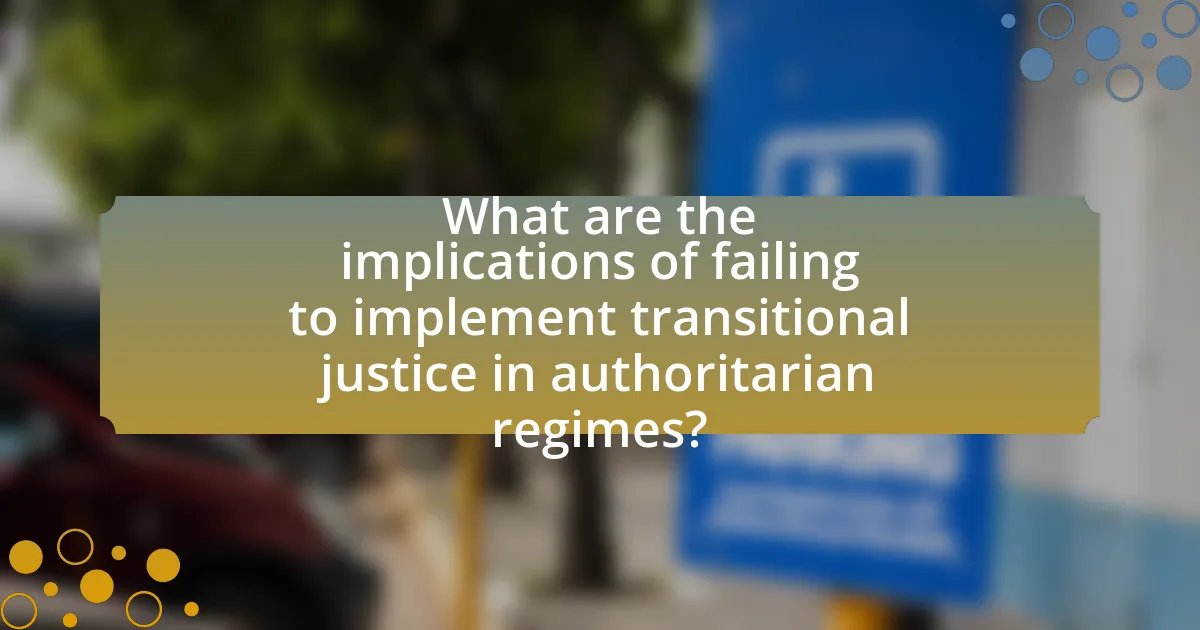
What are the implications of failing to implement transitional justice in authoritarian regimes?
Failing to implement transitional justice in authoritarian regimes leads to prolonged cycles of violence and human rights abuses. Without accountability for past atrocities, such regimes often perpetuate a culture of impunity, which can result in ongoing repression and civil unrest. Historical examples, such as the lack of transitional justice in post-Soviet states, illustrate that failure to address past injustices can hinder democratic development and fuel societal divisions. Additionally, the absence of transitional justice mechanisms can prevent victims from obtaining recognition and reparations, further entrenching grievances and undermining social cohesion.
How does the lack of transitional justice affect societal healing?
The lack of transitional justice significantly hinders societal healing by perpetuating cycles of violence and impeding reconciliation. Without mechanisms to address past injustices, such as truth commissions or reparations, communities remain divided and grievances fester, leading to ongoing tensions. For instance, in post-conflict societies like Rwanda, the absence of comprehensive transitional justice measures has resulted in unresolved trauma and continued ethnic divisions, as evidenced by the 2019 report from the International Center for Transitional Justice, which highlights the importance of accountability in fostering social cohesion. Thus, the failure to implement transitional justice not only obstructs healing but also risks the resurgence of conflict.
What are the long-term consequences of unresolved grievances?
Unresolved grievances can lead to persistent social unrest and hinder the establishment of stable governance. When grievances remain unaddressed, they often foster resentment and distrust among affected communities, which can escalate into violence or civil conflict. Historical examples, such as the Rwandan Genocide, illustrate how unresolved ethnic tensions can culminate in catastrophic violence. Additionally, unresolved grievances can perpetuate cycles of injustice, as marginalized groups may feel compelled to seek retribution, undermining efforts toward reconciliation and peacebuilding. This cycle can also impede economic development, as instability deters investment and disrupts social cohesion.
How does impunity impact future governance and rule of law?
Impunity undermines future governance and the rule of law by eroding public trust in institutions and enabling a culture of lawlessness. When individuals or groups are not held accountable for their actions, it creates a precedent that can lead to further violations of rights and abuses of power. For instance, in countries with high levels of impunity, such as Venezuela, the lack of accountability for government officials has resulted in widespread corruption and human rights abuses, which in turn destabilizes governance structures and diminishes the effectiveness of legal frameworks. This cycle perpetuates a system where the rule of law is weakened, as citizens lose faith in legal recourse and the ability of institutions to protect their rights.
What are the risks of violent backlash against transitional justice efforts?
The risks of violent backlash against transitional justice efforts include increased political instability, social unrest, and potential escalation of violence. In authoritarian regimes, these efforts can threaten the power structures, leading to violent reprisals from state actors or armed groups that feel threatened by accountability measures. Historical examples, such as the backlash faced by truth commissions in countries like Argentina and South Africa, illustrate that when powerful interests perceive transitional justice as a direct threat, they may resort to violence to maintain control. This can result in a cycle of violence that undermines the very goals of justice and reconciliation, making it difficult to achieve lasting peace and stability.
How can transitional justice initiatives provoke state repression?
Transitional justice initiatives can provoke state repression by threatening the power and legitimacy of authoritarian regimes. When these initiatives seek accountability for past human rights violations, they often expose state actors to scrutiny and potential legal consequences, which can lead to defensive measures by the state. For instance, in countries like Egypt and Venezuela, efforts to address past abuses have been met with increased crackdowns on dissent, as the state perceives these initiatives as challenges to its authority. The fear of losing control prompts regimes to intensify repression, including arrests, censorship, and violence against activists and civil society organizations involved in transitional justice processes.
What strategies can mitigate the risks associated with implementing transitional justice?
Strategies to mitigate the risks associated with implementing transitional justice include fostering inclusive dialogue, ensuring community participation, and establishing clear legal frameworks. Inclusive dialogue allows for diverse perspectives, which can enhance legitimacy and reduce resistance from various stakeholders. Community participation ensures that the needs and concerns of affected populations are addressed, thereby increasing the likelihood of acceptance and support for transitional justice measures. Establishing clear legal frameworks provides a structured approach to accountability and reconciliation, minimizing the potential for arbitrary decisions and abuses of power. Historical examples, such as South Africa’s Truth and Reconciliation Commission, demonstrate that these strategies can lead to more successful outcomes by promoting trust and cooperation among conflicting parties.
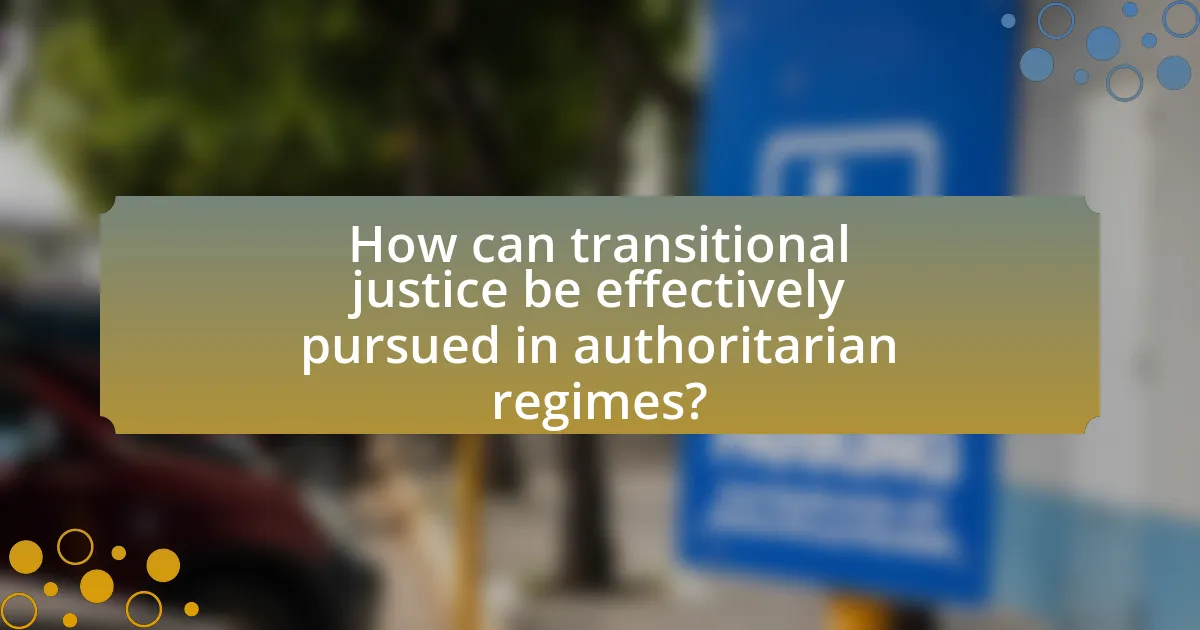
How can transitional justice be effectively pursued in authoritarian regimes?
Transitional justice can be effectively pursued in authoritarian regimes through a combination of international pressure, grassroots mobilization, and the establishment of legal frameworks that promote accountability. International bodies, such as the United Nations, can exert pressure on authoritarian governments to adhere to human rights standards, as seen in cases like South Africa’s transition from apartheid, where global advocacy played a crucial role. Grassroots movements can mobilize public support for justice initiatives, exemplified by the role of civil society in Tunisia post-Arab Spring, which pushed for accountability and reform. Additionally, creating legal frameworks that allow for truth commissions or hybrid courts can facilitate the process, as demonstrated by the establishment of the Extraordinary Chambers in the Courts of Cambodia, which aimed to address the atrocities committed by the Khmer Rouge. These strategies collectively enhance the prospects for transitional justice in contexts where authoritarian regimes resist change.
What strategies can be employed to promote transitional justice in these contexts?
To promote transitional justice in authoritarian regimes, strategies such as establishing independent truth commissions, fostering international support for accountability mechanisms, and engaging civil society in the justice process can be employed. Independent truth commissions can document human rights violations, providing a platform for victims to share their experiences, which can help build a historical record and promote healing. International support, including sanctions or diplomatic pressure, can encourage authoritarian governments to comply with justice initiatives. Engaging civil society ensures that the voices of victims and marginalized groups are included, enhancing the legitimacy and effectiveness of transitional justice efforts. These strategies have been utilized in various contexts, such as South Africa’s Truth and Reconciliation Commission, which successfully addressed past injustices while promoting national unity.
How can international support enhance local transitional justice efforts?
International support can enhance local transitional justice efforts by providing resources, expertise, and legitimacy to local initiatives. For instance, financial assistance from international organizations can help fund truth commissions and reparations programs, which are essential for addressing past human rights violations. Additionally, technical expertise from international legal bodies can guide local actors in developing effective legal frameworks that align with international human rights standards. Furthermore, international endorsement can bolster the credibility of local transitional justice processes, encouraging broader community participation and fostering trust in the outcomes. Historical examples, such as the role of the United Nations in supporting transitional justice in countries like Sierra Leone and South Africa, illustrate how international involvement can lead to more robust and effective local justice mechanisms.
What role do grassroots movements play in advancing transitional justice?
Grassroots movements play a crucial role in advancing transitional justice by mobilizing communities, raising awareness, and advocating for accountability and reparations. These movements often emerge in response to human rights violations and seek to amplify the voices of victims, thereby influencing policy changes and promoting societal healing. For instance, in countries like Argentina and South Africa, grassroots organizations have been instrumental in pushing for truth commissions and legal reforms that address past injustices. Their efforts not only foster public discourse around justice but also pressure governments to implement transitional justice measures, demonstrating the significant impact of grassroots activism in challenging authoritarian regimes.
What best practices have emerged from successful transitional justice initiatives?
Successful transitional justice initiatives have established best practices that include inclusive participation, victim-centered approaches, and the establishment of accountability mechanisms. Inclusive participation ensures that diverse voices, particularly those of marginalized groups, are involved in the process, fostering legitimacy and ownership. Victim-centered approaches prioritize the needs and rights of victims, facilitating healing and reconciliation. Establishing accountability mechanisms, such as truth commissions and legal prosecutions, helps to address past atrocities and deter future violations. These practices have been validated by various case studies, including South Africa’s Truth and Reconciliation Commission, which demonstrated the effectiveness of inclusive dialogue and accountability in promoting societal healing.
How can lessons from successful cases inform future efforts in authoritarian regimes?
Lessons from successful cases can inform future efforts in authoritarian regimes by providing strategic frameworks and practical insights that enhance the effectiveness of transitional justice initiatives. For instance, the experiences of South Africa’s Truth and Reconciliation Commission demonstrate the importance of inclusive dialogue and public participation in fostering national healing and accountability. This case illustrates that engaging diverse societal groups can build trust and legitimacy, which are crucial for the success of transitional justice processes. Additionally, the implementation of reparations in Argentina post-dictatorship highlights the necessity of addressing victims’ needs to restore dignity and promote social cohesion. These examples underscore that tailored approaches, informed by historical context and stakeholder involvement, can significantly improve the prospects for justice and reconciliation in authoritarian settings.
What frameworks can guide the implementation of transitional justice in challenging environments?
The frameworks that can guide the implementation of transitional justice in challenging environments include the United Nations’ Guiding Principles on Business and Human Rights, the International Criminal Court’s framework for accountability, and the principles outlined in the Paris Principles on National Institutions for the Promotion and Protection of Human Rights. These frameworks provide structured approaches to address human rights violations, promote accountability, and ensure the participation of affected communities. For instance, the UN’s Guiding Principles emphasize the responsibility of states to protect human rights and the need for effective remedies, which is crucial in authoritarian regimes where traditional justice mechanisms may be compromised.
What practical steps can advocates take to navigate the challenges of transitional justice?
Advocates can navigate the challenges of transitional justice by fostering inclusive dialogue among affected communities, ensuring that diverse voices are heard and represented. This approach helps to build trust and legitimacy in the transitional justice process, which is often undermined in authoritarian regimes. Additionally, advocates should engage in strategic partnerships with local organizations and international bodies to leverage resources and expertise, enhancing the effectiveness of their initiatives. For instance, the International Center for Transitional Justice has documented successful collaborations that have led to more comprehensive justice mechanisms in post-conflict societies. Furthermore, advocates must prioritize documentation of human rights abuses to create a solid evidentiary basis for accountability, as seen in the work of organizations like Human Rights Watch, which has effectively used documentation to support legal actions against perpetrators. These practical steps are essential for overcoming the systemic obstacles present in authoritarian contexts.
